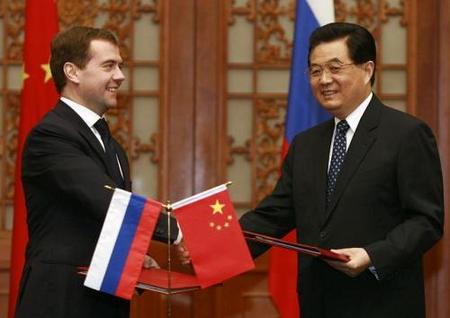
A few weeks ago, I wrote a post on Rajon Menon’s paper, “The China-Russia Relationship, What it Involves, Where It Is Headed, and How It Matters for the United States.” While I titled that post “The China-Russia Strategic Relationship,” I think the title of this post more accurately reflects where the relationship stands today.
To help us understand the relationship between Moscow and Beijing, Stephen Kotkin recently published a review in Foreign Affairs of Bobo Lo’s new book Axis of Convenience: Moscow, Beijing, and the New Geopolitics. Lo directs the Russia and China programs at the Centre for European Reform.
Kotkin’s basic conclusion is similar to Menon’s. He says that “In many ways, the China-Russian relationship today resembles that which first emerged in the seventeenth century: a rivalry for influence in Central Asia alongside attempts to expand bilateral commercial ties, with China in the catbird seat.” Another way of framing the relationship would be to say that it is at bottom a tactical exchange of Russian weapons and energy for Chinese cash, with a dose of Russian hedging against American hegemony on top.
A few points from Kotkin’s article caught my attention:
-Under the terms of a major energy deal agreed to in February, China will receive 300,000 barrels oil a day from 2011-2030 (a total of 2.2 billion barrels) and will pay less than $20 per barrel! While the price of oil in 2030 is anybody’s guess, $20 per barrel certainly seems like a good deal for the Chinese. The unbalanced terms of the deal are an indication = not only the asymmetrical nature of the Chinese-Russian relationship but also of Russia’s “the enemy of my enemy is my friend” perspective with regard to China and the United States.
-Kotkin also points out that – in stark contrast to the United States – China bends over backwards to appear gracious and respectful toward Russia at all times. The clearest manifestation of this is China’s terming of the relationship with Russia as a “strategic partnership.” Failing to treat the Russians with respect during the 1990s dooms the U.S.-Russian relationship to this day.
-Kotkin quotes Russian political analyst Yuri Federov who says that Russia is “doomed to be a junior partner to everyone,” and Kotkin’s article lends weight to Federov’s pessimism. Indeed, after reading Kotkin’s article, it is difficult to avoid agreeing with the substance of Vice President Biden’s remarks with regard to Russia’s medium to long-run future. Russia has sustained its international position in large part due to its friendly relations with China.
But it is likely that Chinese and Russian interests will diverge more sharply as Chinese power increases. For instance, China will eventually develop its own arms industry to a point where it will no longer be as dependent on Russia. Furthermore, as Beijing becomes a more assertive diplomatic player, it will have an interest in limiting Moscow’s international decision-making role.
I found Kotkin’s entire review informative, and look forward to getting my hands on Lo’s book.
— Ben Katcher


7 comments on “The China-Russia Limited Partnership”